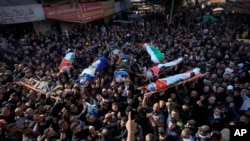The United States is urging de-escalation after nine Palestinians, including an elderly woman, were reportedly killed during a raid by Israeli forces Thursday in the occupied West Bank town of Jenin.
A top State Department official for Middle East affairs said the U.S. is concerned and called the casualties -- which come days before a visit to the region by Secretary of State Antony Blinken -- “regrettable.”
But Barbara Leaf, the assistant secretary of state for Near Eastern Affairs, also said the Palestinian Authority’s subsequent announcement that it is suspending its security coordination with Israel is not the right decision now.
“We’re in very close touch with senior PA (Palestinian Authority) officials. Obviously, we don't think this is the right step to take at this moment,” Leaf told reporters during a telephone briefing on Thursday. “Far from stepping back on security coordination, we believe it's quite important that the parties retain – and if anything, deepen - security coordination.”
Leaf said the U.S. will talk to both Palestinian and Israeli officials during Blinken’s visit to Egypt, Israel and the West Bank in the coming days. Blinken is traveling to the region January 29-31.
The State Department said Thursday Blinken will consult with partners on issues that include “Russia’s invasion of Ukraine, Iran, Israeli-Palestinian relations and preserving the two-state solution to the Israeli-Palestinian conflict, and the protection of human rights and democratic values.”
Israel has provided medical and humanitarian assistance to Ukraine but avoided sending lethal military equipment to Kyiv, a move that could upset Moscow and hurt Israel’s security interests in neighboring Syria, given Russia’s involvement in the war-torn Middle Eastern country.
The United States continues to seek Israel’s support for Ukraine, while refraining from criticizing Israel’s posture on the Russia-Ukraine war.
Blinken’s Middle East trip follows White House national security advisor Jake Sullivan’s meetings with Israeli and Palestinian leaders from January 18-20, when the White House says Sullivan restated Washington’s “unwavering commitment to Israel’s security” to counter the continued threats posed by Iran.
U.S. officials have accused Iran of providing drones to Russia for Moscow’s use in Ukraine, calling such military assistance “deeply destabilizing.”
Iran has acknowledged supplying Russia with drones but maintains the transfer came before Moscow’s war in Ukraine.
During his trip, Blinken will meet with Israeli Prime Minister Benjamin Netanyahu, Foreign Minister Eli Cohen and other senior officials in Jerusalem. In the West Bank, Blinken will meet with Palestinian Authority President Mahmoud Abbas and other senior PA officials.
“With both Israeli and Palestinian leaders, the secretary will underscore the urgent need for the parties to take steps to deescalate tensions in order to put an end to the cycle of violence that has claimed too many innocent lives,” according to a State Department statement. “He also will discuss the importance of upholding the historic status quo the Haram al-Sharif/Temple Mount in Jerusalem, in words and in actions.”
In early January, after a visit to the al-Aqsa Mosque compound by an ultranationalist Israeli Cabinet minister, U.N. Security Council members gathered to reaffirm the need to preserve the historic status quo at Jerusalem’s holy sites.
In Cairo, the secretary of state will meet with Egyptian President Abdel Fattah el-Sisi and Foreign Minister Sameh Shoukry to advance the U.S.-Egypt strategic partnership, discuss shared support for elections in Libya and the ongoing Sudanese-led political process.












